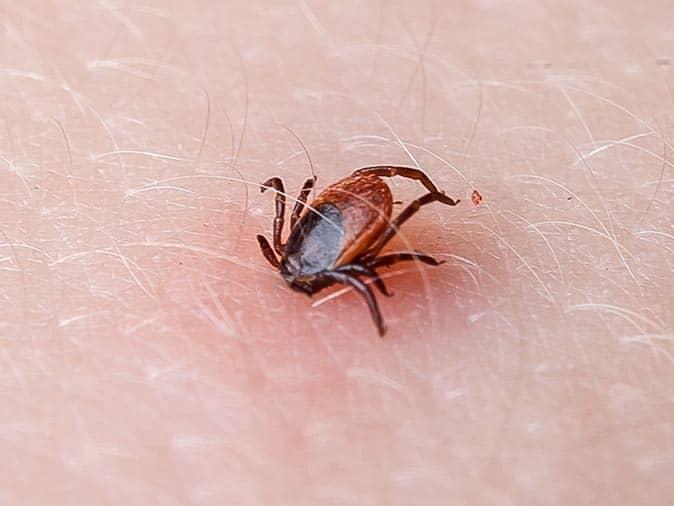How dangerous are deer ticks? Well, on a scale of one to ten, an infected deer tick is a one hundred! Infected ticks are responsible for transmitting some serious, and even deadly, diseases like Lyme disease, babesiosis, anaplasmosis, and the emerging Powassan virus. Because you do not know which ticks are infected and which ones are not, it is important to know a deer tick when you see it and to protect yourself from contact with them.

The blacklegged tick, or deer tick, is only one of many species of tick that can transmit disease, but it is the most common one in our area, so we will focus on this tick. The adult deer tick is tiny, measuring in at a mere 1/4 inch. The males are dark brown to black, and the females have black heads and orange colored bodies. They are about the size and shape of an apple seed – with 8 legs. Yes, ticks are a part of the arachnid family! The nymphs are only about 1-2 mm in length, or about the size of a poppy seed. They are black and very hard to see.
Of course, one way to easily avoid ticks is to avoid any wooded or grassy areas where ticks commonly live; but this is impractical and not overly effective since ticks can be practically anywhere. There are even accounts of ticks crawling onto people while they are sitting in a doctor’s waiting room or in a library. This is because ticks can secretly crawl onto people, travel with them where they travel, and hop off to find a host that will more easily meet their needs (more exposed skin). Ticks can also hang out in the perfectly manicured lawn in your back yard when they are carried there by a woodland creature like a mouse or a squirrel.
The very best way to avoid contact with ticks is to use an insect repellent that contains DEET whenever you spend time outside. Limit the amount of exposed skin by wearing long sleeves and long pants that are tucked into your socks. Closed-toed shoes are a good idea, as well. It is a good idea to wear light colored clothing which makes it easier to spot ticks when they crawl onboard. Also, it is imperative that you check your family and your pets for ticks when you return from spending time outside. Showering when you come inside and treating pets with a veterinarian approved tick control products are important preventative measures as well.
However, ticks are sneaky little insects and can still find ways to get to their favorite food source – mainly your blood. Keeping ticks off your property helps to reduce their numbers reducing the chances of contact with them. This is where Arrow Pest Control comes in. We offer ecologically responsible, effective solutions that will control the number of ticks on your property. To learn more about our tick treatment options, contact us today.














